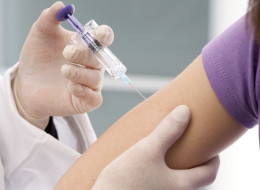Source: www.huffingtonpost.ca
Author: Sunnybrook Health Sciences Centre
April 26 to May 2 is National Immunization Awareness week in Canada. One immunization known for raising a lot of questions is the Human Papillomavirus (HPV) vaccination, provided free of charge in Ontario to girls in grades 8-12, and following provincial schedules across the country.
While there is lots of information online, at school and at the doctor’s office about HPV, there is still a lot of confusion about what it may mean for your loved ones. Dr. Nancy Durand, gynecologist at Sunnybrook, explains three little-known facts about HPV.
1) HPV causes cancer in men, too
When Michael Douglas candidly revealed his oral cancer was caused by HPV, many people expressed surprise.
Even though HPV has traditionally been thought of as a disease that affects women and mainly causes cervical cancer, men are actually at higher risk of being diagnosed with certain types of HPV-positive cancers than women.
“It’s not well understood why men are at higher risk for HPV-positive oral cancer, but it does point out that vaccination in men is even more important than we may have previously thought,” says Dr. Durand. Physicians are learning more and more that HPV can also cause other cancers in both women and men, such as anal cancers and head & neck cancers (cancers of the base of the tongue, tonsils and soft palate).
2) Not all HPV infections lead to cancer
You’ve probably read some of the (slightly scary) statistics about HPV: Three in four Canadians will get HPV in their lifetime. It can lead to a variety of cancers and cause genital warts, and there is no cure. But should this keep you up at night, worrying about the potentially deadly consequences of HPV?
Hardly, says Dr. Durand. “Most people who are infected with this virus will clear it — probably 80 per cent of people. It’s the other 20 per cent of people with a persistent infection who may be at risk of cancer, and it’s still only a very small percentage of those people who may go on to develop cancer,” she says.
Many people never even realize they’ve had an HPV infection, as there are usually no symptoms, and the infection often goes away on its own.
3) You’re never too old to get the HPV vaccine
What if you didn’t get the HPV vaccine back in middle school, and now you think it’s too late to get it?
“Regardless of your age and your onset of sexual activity, we can vaccinate both men and women, and we can see a reduction in disease,” says Dr. Durand.
It’s actually not too late — the vaccine can still be effective, even in adults who’ve already been sexually active. “Many people think vaccination can only be done before the onset of sexual activity. But regardless of your age and your onset of sexual activity, we can vaccinate both men and women, and we can see a reduction in disease,” says Dr. Durand.
Anyone, male or female, over the age of nine can be vaccinated. So, if you’ve put off getting the vaccine because you thought you were too old, it’s not too late!
Note: Co-authored by Sybil Millar, Communication Advisor at Sunnybrook Health Sciences Centre


Leave A Comment
You must be logged in to post a comment.